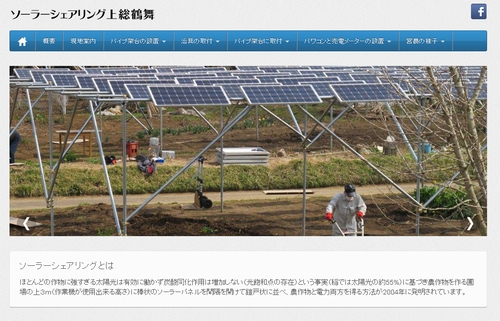August 16, 2013
Solar Sharing Program through Solar Panels on Farmland Launched
Keywords: Food Non-manufacturing industry Renewable Energy
Installing solar panels above farmland, Solar Sharing Kazusatsurumai began operations of a photovoltaic generation system in April 2013 in Ichihara City, Chiba Prefecture, Japan. The system is installed above 750 square meters of farmland, annually producing 35,000 kilowatt-hours of electricity, equivalent to the consumption of 10 households.
Solar Sharing is a method of producing crops and electricity at the same time by installing compact solar panels at regular intervals above farmland where crops are growing. Although solar panels shade crops on farmland, too much sunshine can be harmful to crops. In addition, the photosynthetic activity of crops cannot be promoted beyond a certain level of sunshine. In short, this technology shares sunshine between agriculture and power generation.
Japan's Agricultural Land Act prohibits the use of farmland for purposes other than agriculture. In April 2013, however, the Ministry of Agriculture, Forestry and Fisheries of Japan issued a notice to permit the temporal conversion of farmland to fix poles for purpose of installing solar panels if appropriate cultivation of crops is ensured.
With the feed-in-tariff scheme established in July 2012, the spread of solar sharing throughout Japan should be monitored.
Related
"JFS Newsletter"
- 'Yumekaze' Wind Turbine Project Connects Metro Consumers and Regional Producers: Seikatsu Club Consumers' Co-operative
- Shaping Japan's Energy toward 2050 Participating in the Round Table for Studying Energy Situations
- Nishiawakura's Initiative for 100% Energy Self-Sufficiency, and a Municipal ICO Scheme
- Actions Toward 100% Renewable Energy in Japan
- Sustainable Community Building in Shimokawa: Recycling-Oriented Forest Management Enabling Permanent Use of Forest Resources
Related
"Popular Articles"
- Current Status of Renewable Energy in Japan (2015)
- Offshore Wind Farm Withstands Great East Japan Earthquake and Tsunami
- Current Status of Renewable Energy in Japan (2014)
- Geothermal Power: Japan Has World's Third Largest Geothermal Reserves, 60 Percent of Which Can Be Developed
- Tokyo Plans to Increase Renewable Energy Ratio to 20% by 2024



